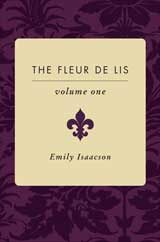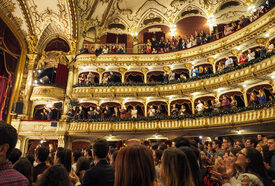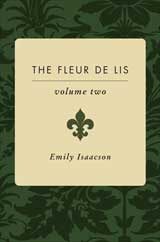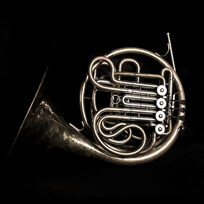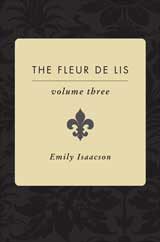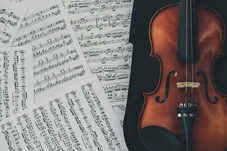Director's Notes: The Fleur-de-lis
"We have constructed a play, and when we stand to give our soliloquy, we will see again the matchless heaven, the sounding board earth, and the view from the shadows."
Emily Isaacson
If these delicate feet could dance, the spaces would echo with tears, but the room is silent and visitors come in and out, and the windows reveal young girls outside, in imagined old leotards and ballet shoes, scuffed with time . . .
The fury of the imagination is passion, and, in a stenciled, choreographed life, no movement is immaterial. Timing is exact, and the curve of your hand or the tilt of your head string a nice set of scales. When the movement is mastered, the next position demands attention and the next, like a succession of children holding hands. The creation is of the author, and passion is their forward movement.
In this book, the time that tries and the future go hand in hand. There is a responsibility to tell the truth but to veil it—through myth and symbol, through character and atmosphere, through description and abdication—so that it remains respectful of other’s truths. That is the onus of poetry. The poet finds himself both master and servant, attuned to the slightest sound of nature, observer of all human nature. He seeks to attest to difference and similarity in humans, to define the road of prudence, and witness to the earth in all seasons of birth and gestation. That which nature holds in her bosom is replenished, and so the poet’s words: with each new stroke of a pen, he enlivens the hearts he writes upon and finds meaning, renewing the cause of liberty.
We find richness beyond compare in deeply-felt poetic sentiment. When a reader can identify with a time, place, or person within its frame, we know that the road of literature has met us and that we have not parted ways. We can attempt to formulate our lives or imagine them into being. All things are the subject of scrutiny, reasoned with, fought with, finally brought to reason on the road of literature.
People seek out the immaculate conception in statues, scriptures, icons, and monuments, seeking the moment at which spirit becomes flesh and the spiritual nature leaves an imprint in the material world. In the field where we labor side by side, we come to perceive authenticity. There is no solace from evil except in communion. In each relevant moment, we awaken into a deeper tryst with our God-center, the immaculate conception becoming an oracle: what separates reality from what we chose as our destiny, the fantasy world from the supernatural. We are born from a heaven of miracles to an earth of poverty. Once, it was commended to speak in the tongues of men and of angels, but now it is only enough to love. In the midst of beauty and frailty, there is a quickening of hope that as the dawn we will outdo the night and speak.
This response requires courage and dignity, bravery, and the chastisement that brings peace. In all things, may there be peace, and in the divine warrior, there is no blood tide, no crimson conflict, no jaded response. There is clarity and purpose and truth. There is a method to renounce what brings fear and embrace what causes love. We will be the victor in the end, of the simple life and bridled pathos.
Humanity is the natural flower of love. Without it the emotion and pathos of mankind would not exist. The poetry of ages past claims God and gods as both supernatural and glorious, capable of imparting their qualities and assets to humans on earth. It induces a liturgical framework for both song and the written word; it abdicates attention from the minute to the larger scale. In the beginning, the world was dark; now, with poetry, it is lit, although dimly. The poets’ words transcend the dark ignorance of mankind. We are all waiting to be illumined, warned, caught in the throes of innocence, tamed. For a future happiness, we delay gratification, wait for a somber yield, the structure of planting and harvest. For the present, we hope for a renunciation of suffering, of poverty, of illness.
When I first discovered the poetry of C.S. Lewis and Ruth Pitter’s biography, Hunting The Unicorn, I had no idea that I would be the privileged sharer of a figurative relationship between two poets that entailed the Oxford cloak all of Lewis spiwery, his thoughts, her ideas: of the chartering of freedom after a war, the imagination of a poet, of story’s legacy, of a bloodied people. Looking back from the other side of prolific skill with such destiny, of aloneness echoing the fury of gods, from the stilted movements of a few last composers against the night; God in all three persons resounded like a hunting horn, and we were the hunted.
I will not cease from mental fight,/ Nor shall my sword sleep in my hand/ Till we have built Jerusalem/ In England’s green and pleasant land.
—William Blake
We are taming the oracle of our years, of distance and of silence. We have constructed a play, and when we stand to give our soliloquy, we will see again the matchless heaven, the sounding board earth, and the view from the shadows.
I opened the arms of my soul and embraced the world.
—Emily Isaacson, director
The Wild lily Institute
Published in The Fleur-de-lis Volume I, 2011


